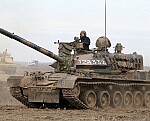On the Brink: Contemplating the Shadow of World War III in Light of Current Global Conflicts
In a world increasingly interconnected yet paradoxically divided, the ongoing conflicts in Ukraine and Israel, among others, have reignited discussions about the possibility of a global conflict on the scale of World War III. This article seeks to explore these tensions, examining how current events could escalate into a larger, more devastating conflict, and what this means for the future of international relations.
In the shadow of history, the specter of a third World War has periodically arisen, stoking fears and speculations among nations, leaders, and citizens alike.
The Global Landscape: A Tapestry of Tensions
-
Rising Powers and Shifting Alliances: The post-Cold War era has seen a significant shift in global power dynamics. China's meteoric rise, both economically and militarily, poses a challenge to the established power of the United States. The U.S.-China rivalry, particularly in the South China Sea and over Taiwan, has been a focal point of global tension. Additionally, Russia's actions in Ukraine and its broader aspirations to reclaim its Soviet-era influence have further complicated international relations.
-
Regional Conflicts and Proxy Wars: The world is witnessing numerous regional conflicts that have the potential to escalate. The Syrian Civil War, the Yemen crisis, and tensions between Iran and Saudi Arabia are just a few examples where larger powers are often involved indirectly, raising the stakes and the risk of broader conflict.
-
Nuclear Proliferation and Arms Races: The spread of nuclear weapons remains a critical concern. Nations like North Korea continue to develop their nuclear capabilities, while established nuclear powers like the U.S., Russia, and China are investing in modernizing their arsenals. This nuclear backdrop makes any major conflict riskier and potentially more devastating.
-
Cyber Warfare and Non-Traditional Threats: Modern conflicts are increasingly characterized by non-traditional forms of warfare, including cyber attacks. These attacks can destabilize nations without a single shot being fired, and the ambiguity of cyber warfare complicates international norms and response strategies.
Historical Context and Lessons
History teaches that world wars are not inevitable but are the result of a confluence of factors, including unchecked nationalism, alliance entanglements, arms races, and failures of diplomacy. The First and Second World Wars were precipitated by a combination of these elements, alongside specific triggering events. Today, while some parallels exist, there are also significant differences, such as the presence of nuclear weapons, which act as a deterrent through the doctrine of mutually assured destruction, and a more interconnected global economy, which makes total war less appealing.
Diplomacy and International Institutions
The role of international diplomacy and institutions like the United Nations in preventing global conflict cannot be overstated. These bodies, though imperfect, provide platforms for dialogue and conflict resolution. The lessons of the 20th century have led to a greater emphasis on diplomatic over military solutions, though the effectiveness of these institutions is often questioned.
The Ukraine Crisis and the Shadow of a Larger Conflict
The conflict in Ukraine, beginning with the annexation of Crimea in 2014 and escalating with the Russian military intervention in 2022, has dramatically altered the European security landscape. This conflict has not only strained relations between Russia and Western powers but also raised fears of a broader escalation. The involvement of NATO countries through sanctions and military support to Ukraine, juxtaposed with Russia's nuclear capabilities and its doctrine of strategic deterrence, creates a precarious situation. The risk lies in the potential for miscalculation or unintended escalation, which could draw multiple nations into a direct and possibly global conflict.

The Israeli-Palestinian Conflict: A Perennial Flashpoint
The Israeli-Palestinian conflict, while regional, has always had the potential to spark wider tensions. The deep-rooted and complex nature of this conflict, involving issues of national identity, territorial rights, and religious significance, makes it a focal point for regional and international powers. The involvement of countries like the United States, Iran, and various Arab nations, each with their own strategic and ideological interests, adds layers of complexity. The potential for this conflict to escalate or to trigger broader regional unrest remains a persistent concern.
The Role of Alliances and International Relations
The current global landscape is marked by intricate alliances and rivalries. NATO's expansion and actions, perceived threats by Russia and China, and shifting alliances in the Middle East all contribute to a volatile international environment. The interconnected nature of these relationships means that a conflict in one region can have far-reaching implications, potentially drawing in multiple countries and escalating beyond original intentions.
Nuclear Proliferation and the Risk of Catastrophe
The proliferation of nuclear weapons adds a terrifying dimension to the prospect of a World War III. The principle of Mutually Assured Destruction (MAD) that governed Cold War dynamics is less predictable in today's multipolar world. Nations like North Korea, Pakistan, and India, along with established nuclear powers, possess the capability to inflict unprecedented damage, raising the stakes of any military conflict.
Conclusion: The Path Forward
While the possibility of a World War III is a subject of grave concern, it is not an inevitability. History has shown the resilience of diplomatic efforts and the importance of international cooperation in resolving conflicts. The current global challenges require a renewed commitment to dialogue, understanding, and the pursuit of peaceful solutions. As the world navigates through these turbulent times, the lessons of the past must guide our actions to prevent the tragedy of a third world war.







